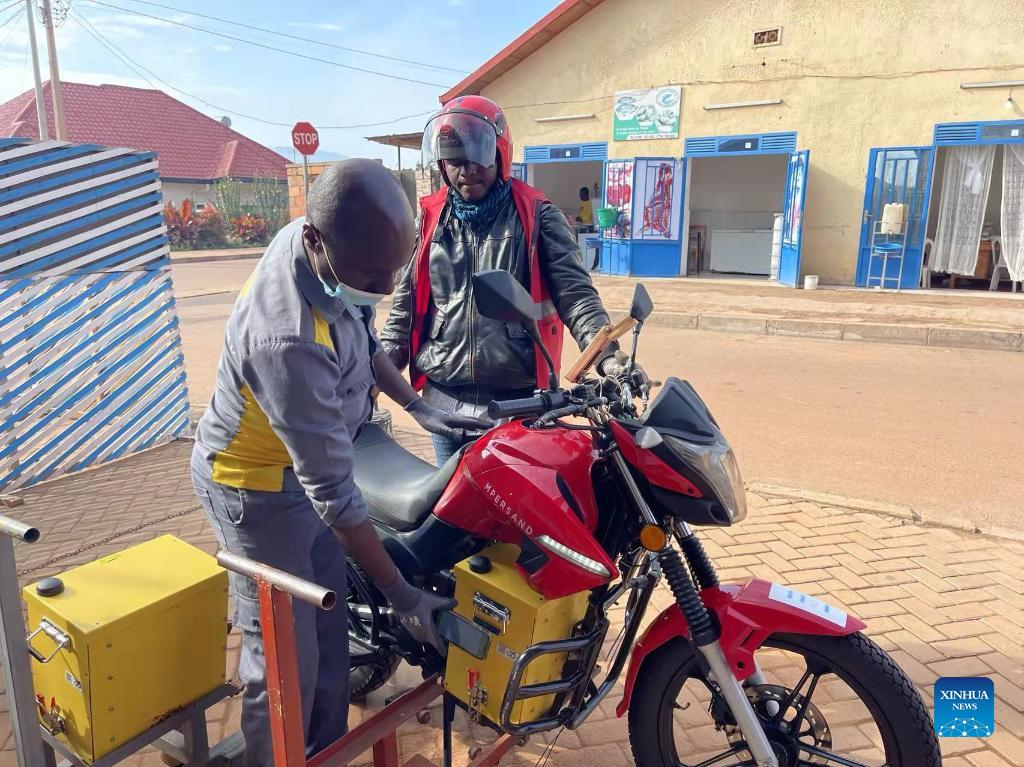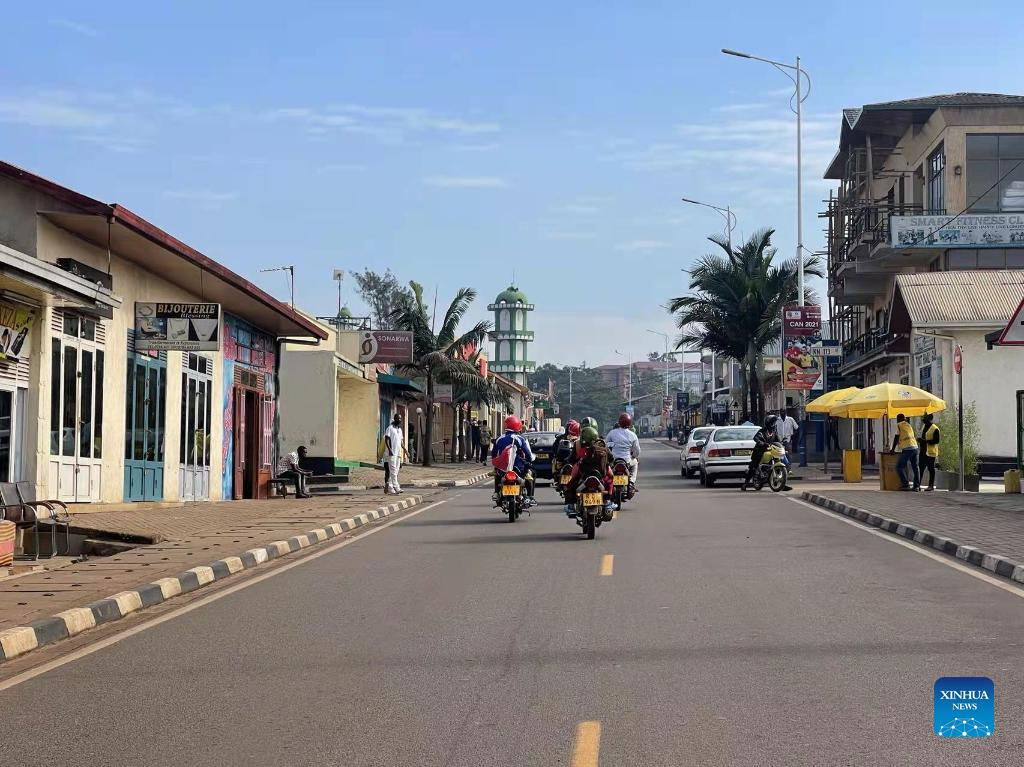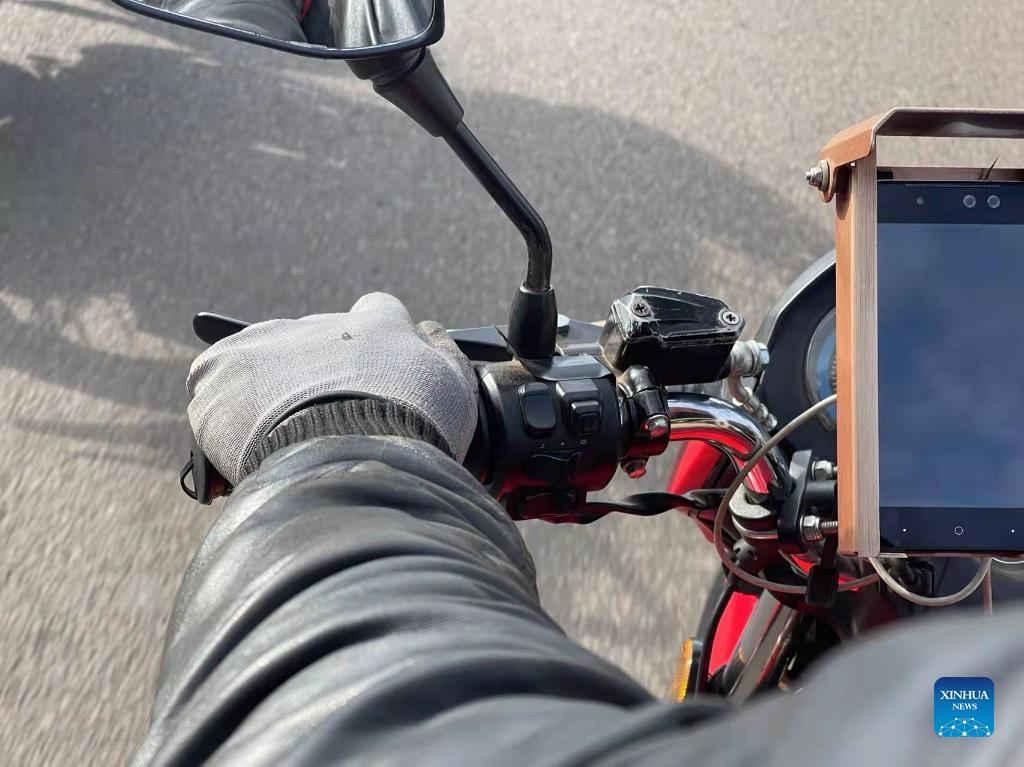
A worker changes a battery for a motorbike driver in Kigali, the capital of Rwanda, Feb. 27, 2022. Electric mobility is on the move in Rwanda, known as the "land of a thousand hills" in the Great Rift Valley where the African Great Lakes and East Africa converge, with more and more motorbike taxi drivers cruising on its roads. (Photo by Martina Fuchs/Xinhua)
KIGALI, March 6 (Xinhua) -- Electric mobility is on the move in Rwanda, known as the "land of a thousand hills" in the Great Rift Valley where the African Great Lakes and East Africa converge, with more and more motorbike taxi drivers cruising on its roads.
In the capital of Kigali, with a population of roughly 1 million, a quiet revolution is underway to help the transition toward a green economy and further promote sustainable development following the 1994 genocide of more than 1 million ethnic Tutsis and politically moderate Hutus.
Josh Whale, the founder and chief executive officer of Ampersand, one of the first electric motorcycle taxi companies on the African continent, said his business in the landlocked country was expanding rapidly.
"We started here in Rwanda in 2016 and we follow the start-up methodology, basically treating the business like a science experiment," he said. "We're putting another 450 motorcycles on the road here for a total of 500, including 60 which will go to Kenya in April. We're in this growth phase and it's happening."
"We really want to see across East Africa at least all motorbikes electric by 2030. That's 5 million taxi motorbikes about half of the entire vehicle fleet of the region. But Rwanda here is our home and this is our first target," he said.
Ampersand's battery swapping system allows motorcycle taxi drivers to simply replace depleted batteries with fully charged ones at one of its swap stations using hydropower from national grids.
"Currently in Rwanda we have about 130 drivers but we're adding about 40 every week as we ramp up. We have eight battery swap stations here in Kigali and we're building another four in Kenya right now," Whale said.
According to him, electric motorcycles or e-motos cost less to buy and operate with up to 83 percent less carbon dioxide emissions.
Niyonshuti Valens, who works at the Nyamirambo swap station in the suburbs of Kigali, said "I like my job because when you consider our vision, it's to protect the environment and climate change and not to pollute the air around."
"When our client comes, I give him the battery. Then I take the battery and put it on the charger. I give him a battery which is fully charged, 100 percent," said Valens.
Whale said that his drivers have already traveled 3.8 million km, but that the journey had only just begun. He is now planning to expand the business across the region and tap into other African nations too in a bid to help fight air pollution, make a social impact and support economic development.
"I started this business originally because of climate change, and that's still a key driver for us. Also cleaning up the air in African cities," he stressed. "We want to help set transport on the continent on a different trajectory and I hope to inspire African and foreign entrepreneurs to set Africa on the future that the whole world needs."
With its hilly and lush landscape and 45 percent of its 12 million population under 18, Rwanda constitutes the perfect launchpad and testing ground for foreign and local start-ups, said Whale. "Rwanda has a fantastic position as the proof-of-concept country. You come here, you prove it. It works. It's easy to set up a company. Rwanda is a great size for testing out different businesses, for start-ups, for big companies, you want to test out new concepts."
It comes as Rwanda has set ambitious targets to become a green, climate-resilient and low carbon economy by 2050. Some of its key strategies include increasing energy efficiency, decarbonizing the power sector, switching to electricity and other low and zero-carbon fuels, and adopting e-mobility.
Last year, the government announced that the transition to e-mobility was a top priority and initiated several incentives including a preferential corporate income tax rate of 15 percent, capped electricity tariffs at the industrial level, and rent-free land for the installation of charging infrastructure.
Whale, a former intellectual property lawyer who lived in Beijing from 2007 to 2013, said he found inspiration from his time in China.
"Elon Musk was just selling the first of the Tesla Roadsters around that time. And suddenly electric was becoming sexy," said Whale. "At the same time, there were already about 200 million electric scooters and e-bikes in Chinese cities. That's what really gave me the idea that electric mobility isn't just something from the rich countries." ■

Motorbike taxi drivers ride e-scooters in Kigali, the capital of Rwanda, Feb. 27, 2022. Electric mobility is on the move in Rwanda, known as the "land of a thousand hills" in the Great Rift Valley where the African Great Lakes and East Africa converge, with more and more motorbike taxi drivers cruising on its roads. (Photo by Martina Fuchs/Xinhua)

A motorbike taxi driver rides an e-scooter in Kigali, the capital of Rwanda, Feb. 27, 2022. Electric mobility is on the move in Rwanda, known as the "land of a thousand hills" in the Great Rift Valley where the African Great Lakes and East Africa converge, with more and more motorbike taxi drivers cruising on its roads. (Photo by Martina Fuchs/Xinhua)
